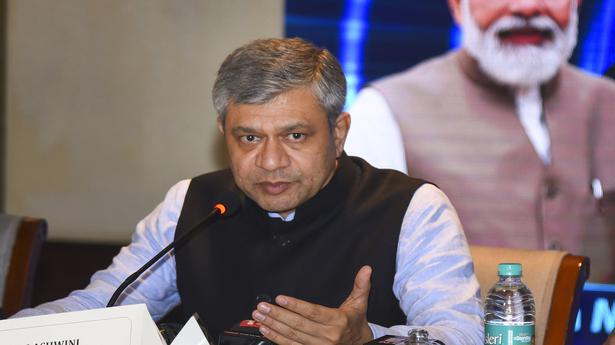Prices will be reasonable, BSNL will be market balancer, regulatory framework will be overhauled, says Ashwini Vaishnaw
Prices will be reasonable, BSNL will be market balancer, regulatory framework will be overhauled, says Ashwini Vaishnaw
5G telecom services will be made available in India from October 2022 onwards and the industry would decide on the pricing structure, Union Communications Minister Ashwini Vaishnaw said on Saturday.
“As soon as spectrum auction ends, within a few days itself, we will allocate the auctions. We expect that the rollout will happen starting in October, and within a year or so, we should have a good rollout of 5G in the country,” he said at a press conference after addressing an investors’ summit.
Stating that the 5G rollout all over the world has been slow, he said, “We believe that we will probably buck the trend of having a much faster rollout of 5G compared to many other geographies since our other costs are significantly under control.”
Read | Auctioning 5G spectrum bands
He said in case of high pricing for 5G services, the government would intervene and state-owned BSNL, which will rollout 5G “very rapidly”, will act as a market balancer.
“As regards pricing of 5G services, on an average in the world, cost of telecom services is ₹2,400 [per month] while it is around ₹200 per month in India, data cost is lowest in India in the world,” he said without giving any specific number.
He said that as of Saturday, the government had fetched ₹1.49 lakh crore from 5G spectrum auction and expressed the confidence that this would cross ₹1.5 lakh crore.
“Close to ₹1.49 lakh crore has been committed by the industry for buying spectrum. This shows how the sector is maturing in a very nice way,” he said.
“The 5G spectrum auction is doing well shows that the industry is taking off, the results are very good,” he said.
“Industry has come out of the old phase, entering a sunrise stage, where new infusion of capital investment can happen,” Mr. Vaishnaw added.
Read | What are the challenges of fiberisation ahead of India’s 5G deployment?
Answering a question that the telecom market is heading for a duopoly considering the precarious financial health of Vodafone India Limited (VIL), in which the government has recently acquired around 33% stake, he said it wouldn’t happen.
“Duopoly will not happen. The September reforms [in the telecom sector] have resulted in good stability in the industry. We are looking at new players to enter the segment. There is going to be good healthy competition in the sector. BSNL will emerge as a good market balancer,” he said.
To a question on the government’s strategy for VIL, Mr. Vaishnaw said, “We don’t want to be on the board of any company. The equity coming to the government will be kept in an entity which does not have any day-to-day relationship with the management of the company. The company will remain a professionally managed one.”
“We believe there will be fresh investment coming in Vodafone Idea. The very fact that they are participating in 5G auction shows that the company should be able to get on to a growth path. We believe that it will be a growth phase for the entire industry,” he said.
Mr. Vaishnaw said that since the volumes are huge in the telecom industry, it has been able to to sustain a higher level of debt. He said most of the issues, such as liabilities on the balance sheets arising out of adjusted gross revenue (AGR) and spectrum issues, had been addressed by the reforms of 2021.
“If something else needs to be done to make the industry healthy, we will do it, so that we are able to reach to remote places too, in far-flung villages as well,” he said.
He said the PLI (production linked incentive) scheme for the telecom sector had fetched very good response. “Close to 31 companies had received permission under PLI, close to 1 lakh crore incremental production is going on under the scheme,” Mr. Vaishnaw said.
“Over the next two-three years, we hope to achieve similar success in telecom equipment manufacturing, like our success in electronics manufacturing. We hope that many of these firms will become exporters and make their mark in the world,” he added.
The Minister said that a new legal structure for the telecom sector was being put in place towards ease of doing business. “A legal structure should be in tune with the times. This kind of industry needs a very stable and forward-looking, futuristic and born-digital kind of law. That is what will spur the next round of growth,” he said, adding that the three archaic laws that currently govern the industry will go.
“We are changing the entire legal structure. We are still governed by an 1885 law, an 1933 law and a 1950 law. The PM has abolished around 1,500 laws. We are going to clean up the telecom legal framework so that there is no disruption to the industry,” he said, adding that a new legal framework would be applicable from August 2023.
“We should ensure that our public policy ensures continuity of services, even when the firms may face insolvency; there should be compounding and decriminalisation if a firm comes forward and admits fault and levies penalty,” Mr. Vaishnaw said.
He said the clear mandate from the Prime Minister was that “India’s telecom sector has to be reformed and globally benchmarked. And now the whole regulatory setup has to become a benchmark for the world”.




